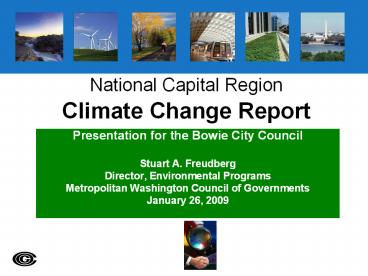National Capital Region Climate Change Report - PowerPoint PPT Presentation
1 / 22
Title:
National Capital Region Climate Change Report
Description:
Support California Low Emission Vehicle Standards. Plan for alternative fuel ... greenhouse gas analyses into comprehensive planning and new capital projects ... – PowerPoint PPT presentation
Number of Views:49
Avg rating:3.0/5.0
Title: National Capital Region Climate Change Report
1
National Capital Region Climate Change Report
- Presentation for the Bowie City Council
- Stuart A. Freudberg
- Director, Environmental Programs
- Metropolitan Washington Council of Governments
- January 26, 2009
2
COG Board Action April 11, 2007
COG Board Action April 11, 2007
- R31-07 creates COG Climate Change Steering
Committee to - Prepare regional inventory of greenhouse gases
- Identify best practices and policies
- Examine climate change impacts
- Recommend regional greenhouse gas reduction
goal(s) - Recommend committee structure for climate change
initiative - Propose advocacy positions
- Prepare recommendations report
- to COG Board
3
Climate Change Steering Committee
- 18 members
- Primarily elected officials from the District of
Columbia, Maryland and Virginia local governments - State environmental representatives from
Maryland, Virginia and DC - Regional transit agency (METRO), Greater
Washington Board of Trade
4
Major Accomplishments
- Greenhouse gas emissions inventory 2005-2050
- Best Practices Report
- Emission reduction goals for 2012, 2020, 2050
- Federal/state advocacy
- Draft Report July 9, 2008
- Listening July 9 Sept. 30
- Final Report Adopted November 12, 2008
5
Best Practices Guide
- HIGHLIGHTS
- Over 2/3 of local governments in the region
purchase renewable energy - Over 1/2 of the jurisdictions have adopted energy
efficiency measures - Nearly 90 of the communities in the region have
embarked on transit oriented development and over
80 have walkable community initiatives - About 70 of communities have green space
protection and green infrastructure programs - All communities in the region have recycling
programs.
Download at http//www.mwcog.org/store/item.asp?
PUBLICATION_ID321
6
Energy and Climate Change Advocacy Positions
Federal Energy Legislation
- Promoted strengthening CAFÉ standards
- Supported green collar job programs
- Supported Energy efficiency block grants to
local governments
Federal Climate Legislation
- Promoted the role of local governments/regional
entities
Regional Climate Program
- Endorsed Cool Capital Challenge
- Sent letter of concern re proposed coal-fired
power plant in Wise County, Virginia
7
Climate Change Report
- Getting Smart on Climate Change
- Climate Change, Potential Impacts on Region
- Current Projected Regional Greenhouse Gas
Emission Inventory - Regional Greenhouse Gas Reduction Targets
- Taking Action
- Energy Consumption
- Transportation and Land Use
- Economic Development Preparing for Impacts,
Financing Outreach and Education. - Moving Forward
- COG Climate Change Program
- Reference Information
8
Global CO2 Emissions Since 1752
9
(No Transcript)
10
Measured Temperature Changes in Chesapeake Bay
Surface Waters
11
Milder Winters, Much Hotter Summers
12
Sea-level Rise Vulnerability in DC Area
13
Greenhouse Gas Emissions Inventory
Total 74 million metric tonnes in 2005 Source
MWCOG 2008.
14
Example of Local Government Greenhouse Gas
Emissions
15
Projections of Regional Greenhouse Gas Emissions
2005-2050
16
Proposed Regional Reduction Goals
2012 10 Below Business as Usual 2020 20 Below
2005 2050 80 Below 2005
17
Major Energy Recommendations
Improve Energy Efficiency/Reduce Energy Demand
- Implement COG Green Building Policy
- Implement Best Practices to reduce local
government energy use by 15 by 2015 - Promote energy efficient building codes
- Promote energy performance contracting/cooperative
purchasing
- Explore energy audit and retrofit program.
- Promote energy efficient street lighting.
- Collaborate with utilities on regional energy
conservation program. - Advocate for rate structure that rewards
conservation investment.
Develop Clean Energy Alternatives
- Local Governments Purchase 20 Renewable Energy
by 2015.
- Remove barriers to renewable energy
implementation.
18
Major Transportation Recommendations
Increase Fuel Efficiency and Clean Fuel Vehicles
- Adopt Regional Green Fleet Policy
- Implement incentives for high mileage and
alternative fueled vehicles - Support California Low Emission Vehicle Standards
- Plan for alternative fuel infrastructure (natural
gas, hybrid-electric, hydrogen) - Explore state/regional alternative fuels standard.
Reduce Vehicle Miles Traveled
- Collaborate with TPB on
- What Would it Take? Analysis
- Regional planning process for reducing
transportation greenhouse gas emissions
- Invest/expand transit use and infrastructure
- Expand commuter options
19
Major Land Use Recommendations
Smart Growth/Comprehensive Planning
- Promote transit-oriented development and
concentrated growth - Establish Transit-oriented development as the
regions preferred growth strategy - Evaluate benefits from directing up to 95 of
new development to activity centers
- Integrate greenhouse gas analyses into
comprehensive planning and new capital projects - Develop standard methodology for evaluating
greenhouse gas emissions from proposed individual
development projects
Tree Canopy Preservation
- Prepare plan to meet goal of increased tree
canopy in region.
20
Additional Recommendations
Adaptation
- Research best practices to prepare for effects of
climate change. - Partner with universities to research climate
change and adaptation strategies.
- Develop a regional climate adaptation plan to
assist localities with vulnerability assessments,
adaptation planning, and emergency preparedness. - Conduct adaptation workshops with major
infrastructure agencies (wastewater, water
supply, stormwater, transportation)
Outreach and Education
- Implement regional public education campaign
- Develop partnerships with private sector and
other organizations.
Financing and Economic Development
- Develop Regional Carbon Offset Fund for
preserving tree canopy
- Promote cooperative regional green purchasing.
21
Next Steps
Next Steps
- 2009 Tasks
- Develop Plan to Meet 2012 Goal
- Advance priority initiatives
- Design outreach and education campaign
- Residential energy audit/retrofit program
- Reducing transportation sector emissions
- Street light replacement
- Green fleet policy
- Develop Advocacy positions for Federal/State
Legislative Sessions
22
COG Board Action April 11, 2007
For further information
- To obtain an electronic copy of the final report
- http//www.mwcog.org/store/item.asp?PUBLICATION_ID
334 - Questions?
- Stuart A. Freudberg, COG Environmental Director
- sfreudberg_at_mwcog.org, 202/962-3340































